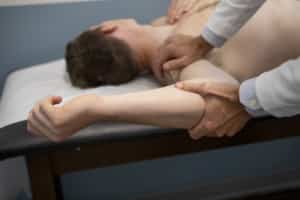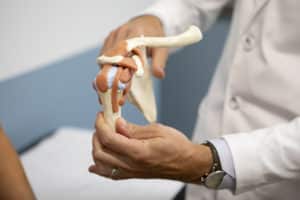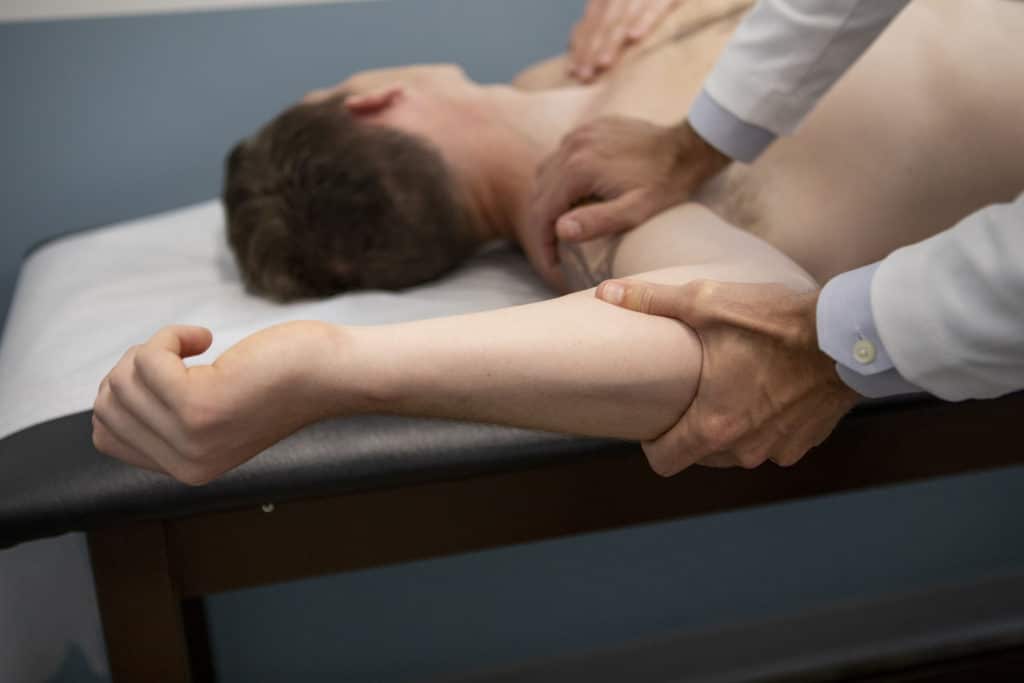I Injured my shoulder! Should I rest it?
 I injured my shoulder! Should I stop working out? Should I wear a sling? Should I see an orthopaedic doctor?
I injured my shoulder! Should I stop working out? Should I wear a sling? Should I see an orthopaedic doctor?
Depending on the circumstances surrounding your injury or pain, these questions may be swirling about in your head, and the answer to these questions could vary.
Of course, very mild aches and pains can be a normal part of life.
Illness, exercise, sports, aging…all of these can lead to soreness, mild temporary aches, and fatigue. It would be unusual to pass an entire lifetime without any trace of discomfort in our bones and joints. These types of pains can and should certainly be tolerated and should not cause alarm. When we do experience them, it is best to stay active and not allow these symptoms to affect our active lifestyle.
However, shoulder pain that is more severe, longer-lasting, or accompanied by significant weakness or loss of motion should not be “brushed off.”
An orthopedic shoulder specialist like Johnny T. Nelson, MD is specially trained in diagnosis and treatment of any and all causes of shoulder pain. Based on questions that he will ask you about the type of pain you have, location of the pain, how long the pain has been present, as well as findings on physical examination, x-rays, and possibly ultrasound of your shoulder, he will be able to give you direction on whether or not further treatment is necessary or if it is okay to continue with life as usual.
For example, if your pain began after a more serious accident, for example a car accident or a fall, it is very important to rule out serious problem such as broken bones or torn rotator cuff tendons. This is usually done with a combination of x-rays and physical examination. Dr. Nelson also uses in-office ultrasound to diagnose these conditions as well without having to resort to more costly and time-consuming MRIs.
There are other conditions, such as bursitis, rotator cuff tendinitis and inflammation, and arthritis that are okay to live with, and continuing to workout is usually okay and safe. Of course, some modifications of your workout regimen may be necessary to avoid inflaming or aggravating the shoulder further.
It is almost never necessary or advisable to wear an arm sling or shoulder immobilizer unless a physician recommends it.
Unnecessary sling use can lead to more stiffness and pain, and does not contribute much to healing. Slings are usually only used for short periods of time after either serious shoulder injuries (broken bones or dislocations) or after shoulder surgery.
Sometimes if the patient has very severe pain, it may be a good idea to stop working out for a short whi le to focus on more basic exercises to rebuild shoulder health, such as strengthening the rotator cuff muscles, stretching out the shoulder blades, and working on posture and core strengthening. This also allows for time for a proper workup to rule out more serious causes of pain (for example, rotator cuff tears).
le to focus on more basic exercises to rebuild shoulder health, such as strengthening the rotator cuff muscles, stretching out the shoulder blades, and working on posture and core strengthening. This also allows for time for a proper workup to rule out more serious causes of pain (for example, rotator cuff tears).
Also, as we age, some types of exercising, such as very heavy weights and plyometrics, may not be suitable for our level of conditioning and physical activity, so it may be necessary to discontinue some exercises altogether. However, every exercise that is discontinued should be replaced by another because, as Dr. Nelson always says, if you don’t move it, you lose it!
Once a diagnosis is made, Dr. Nelson can then recommend treatment. Very rarely, this includes surgical treatment, but more often it may include watchful waiting, oral anti-inflammatories, physical therapy, injections, a home exercise program, chiropractic care, or possibly even referral to a different physician.
Do you have shoulder pain? Are you unsure of where to go next or who to listen to? Call 919-872-5296 to make a visit with Raleigh’s Shoulder Doctor, Johnny T. Nelson MD.
I Injured my shoulder! Should I rest it? Read More »



